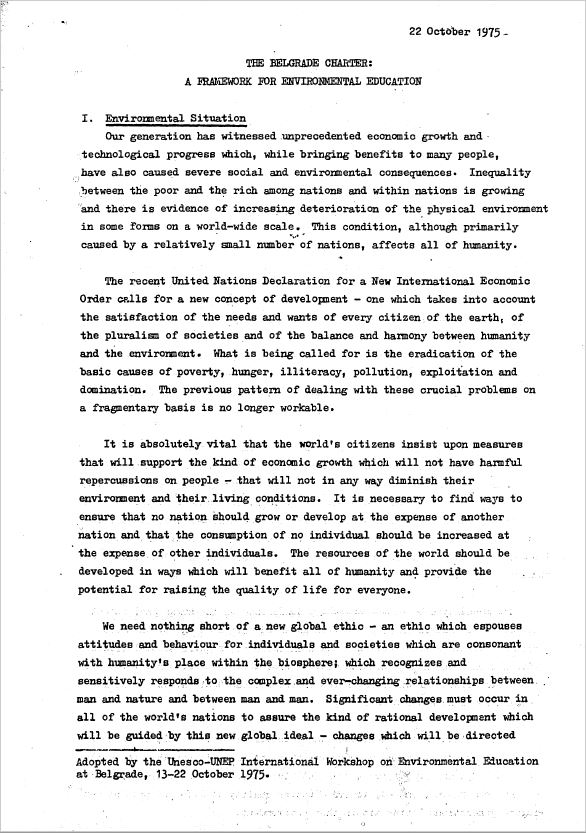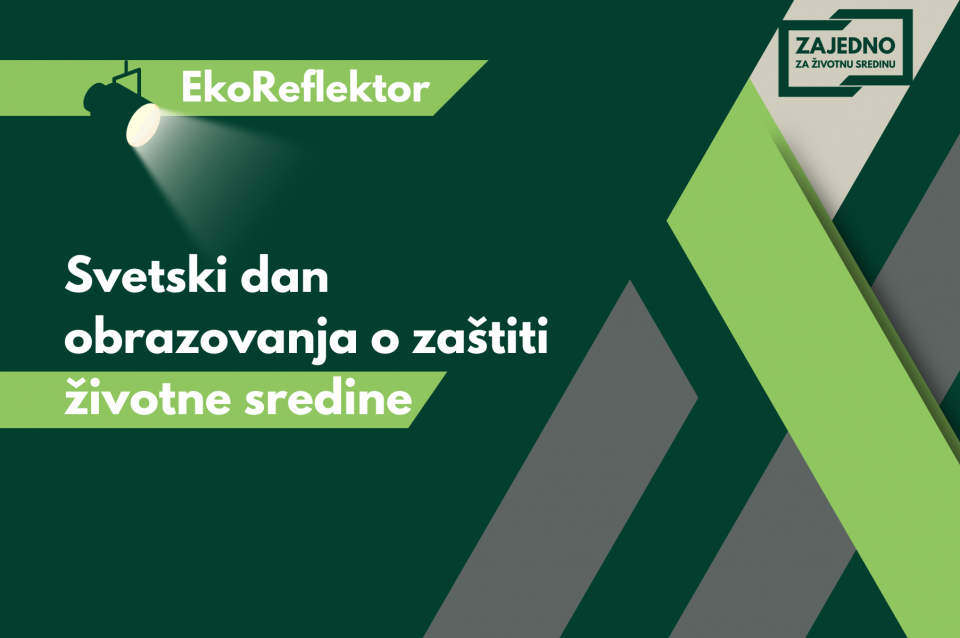When explaining how important a process or concept is, it's always handy to refer to Nelson Mandela. Among other things, he said: "Education is the most powerful weapon you can use to change the world."
Perhaps this, or similar thoughts, was the inspiration for the delegates of numerous countries who gathered in 1975 at the International Workshop on Environmental Education, held in Belgrade, where the "Belgrade Charter" was published. In the introduction, the Charter has an explanation of the state of the environment - it is stated that the environment is under great pressure due to economic development and technological progress which, although they bring benefits to a large number of people, have numerous social and ecological consequences. The Belgrade Charter states that the goals of environmental protection education are: awareness, knowledge, attitude, skills, assessment ability and participation. It is also interesting that it says that each country should define what "quality of life" means for its citizens.

Photo source: eusteps.eu
After Belgrade, an important Intergovernmental Conference on Environmental Education was held in Tbilisi in 1977, where frameworks, principles and guides for environmental education were developed in more detail.
The conference provided guidelines and recommendations that served as a basis for the development of national environmental education strategies. It was a wind at the back of governments and organizations, which encouraged them to develop programs and take concrete steps to preserve the environment.
Ecological, as we often call it, that is, education about environmental protection has been a part of formal education for a long time through classes in schools and universities that deal with the environment and other related topics. Also, informal education is very present and as many as 83% of civil society organizations state that education about environmental protection/sustainable development is the topic they deal with, and 63% of organizations that education is their most frequent activity (REC Serbia, 2015) [1]. On the other hand, citizens and representatives of institutions agreed that to transfer knowledge from ecology in the right way, cooperation with civil society organizations is necessary (Eco Center, 2014) [2].
New technologies and the development of the Internet have given new opportunities to environmental educators. Now it is easier to reach a larger number of people and work and knowledge are more accessible.
Young Researchers of Serbia (MIS) launched an e-learning platform in 2013. E-learning, especially learning through online courses, has several advantages: it is cheaper than traditional learning, it is more suitable for those who have work and family obligations, it does not require travel and other resources (it has a smaller ecological footprint), users can choose their own pace of learning, can be used multiple times, usually has an additional incentive in the form of a certificate, etc. On the other hand, the lack of interaction with other people, the need for self-discipline and the possibility of using online help in tests are considered to be some of the main disadvantages.
There are currently 13 courses on the MIS platform and over 1500 registered users. MIS courses fit into other activities of the organization that are informal learning: from workshops, seminars, training to volunteer camps.
Globally, the number of programs that provide an opportunity to learn about nature and biodiversity through a direct stay in nature is on the rise.
Unfortunately, when we stop for a moment and think about the situation in Serbia, and also look around us if we are on the street, we see that we have not progressed very much in the last, almost, 50 years since the Belgrade Charter was adopted.
However, we, as a large community of civil society and activists, believe in the words of Nelson Mandela and continue to change the world, primarily Serbia, through environmental education. We know how important awareness, knowledge, attitude, skills, ability to assess and participation in environmental protection are. That's why we try to use our knowledge and experience to influence all those who play an important role in preserving the environment, in which we currently live, and which we leave for some future generations.
The text was created within the section "EcoReflektor" on the website zazivotnusredinu.bos.rs.
Author: Young researchers of Serbia
[1] Civilno društvo Srbije u oblasti zaštite životne sredine, priredila Ivana Tomašević, Regionalni centar za životnu sredinu za Centralnu i Istočnu Evropu – REC Srbija, Beograd 2015, str. 13-14.
[2] Rodna perspektiva održivog razvoja, Projekat "ZAinteresovani ZA održivost ZAštićenih područja - uključiti, povezati i ojačati.”, priredio Dejan Zagorac, Eko Centar, Beograd, http://www.mis.org.rs/vss/ pages/sr/ekoloski-programi/vode/zainteresovani- za-odrzivost-zasticenih-podrucja.php

 381 60 30 65 800
381 60 30 65 800






